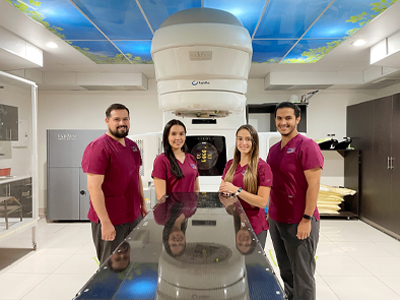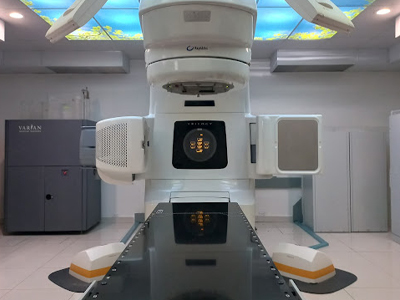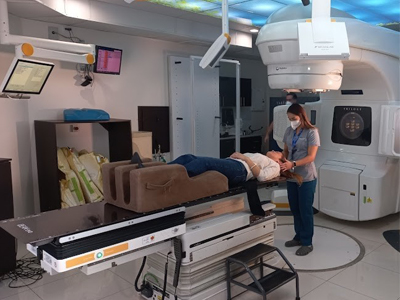El cáncer rectal se define como el tumor ubicado entre el margen anal y los 15 cm hacia proximal. En el cáncer de recto, una precisa estadificación preoperatoria permite clasificar correctamente a los pacientes para las diversas terapias existentes, así como seleccionar el mejor tratamiento quirúrgico.
Cáncer Colorrectal y su Tratamiento

¿Qué es el cáncer Colorrectal?
FACTORES DE RIESGO
El envejecimiento es el factor de riesgo más importante para la mayoría de cánceres. Otros factores de riesgo del cáncer colorrectal son los siguientes:

ANTECEDENTES FAMILIARES: De cáncer colorrectal en un pariente de primer grado.
ANTECEDENTES PERSONALES: De adenomas colorrectales, cáncer colorrectal o cáncer de ovario.
Afecciones Hereditarias: Como la poliposis adenomatosa familiar (PAF) y el síndrome de Lynch (cáncer de colon sin poliposis hereditario [HNPCC])
CONSUMO EXCESIVO DE ALCOHOL
TABAQUISMO
RAZA U ORIGEN ÉTNICO AFROAMERICANO
OBESIDAD
Características Clínica
Los síntomas del cáncer de recto son similares a los del cáncer de colon y dependerá del tiempo de evolución y de su localización (distancia del margen anal, ubicación en pared anterior, circunferencial, etc) entre ellos, los siguientes:

SÍNTOMAS: Hemorragia rectal, Cambio del hábito intestinal, Dolor abdominal, Obstrucción intestinal, Cambio en el apetito, Pérdida de peso, Debilidad.
Con excepción de los síntomas de obstrucción, estos síntomas no siempre se correlacionan con el estadio de la enfermedad ni significan un diagnóstico en particular.
DIAGNÓSTICO: La forma de hacer el diagnóstico está al alcance de todo médico y sólo consiste en un tacto rectal (TR) en el cual se palpará una masa tumoral irregular en general dura y habitualmente fija. Se cree además que en la actualidad no sólo debe considerarse el tacto rectal en el diagnostico sino el estudio endoscópico bajo (colonoscopia) en todo paciente mayor de 40 años que consulte por hematoquecia (eliminación de sangre visible por el recto). El hallazgo de lesiones neoplásicas en el examen endoscópico se acompañará del estudio anatomopatológico de biopsias el cual debiera confirmar el diagnóstico de adenocarcinoma.
ESTADIFICACIÓN
En pacientes con CR, la estadificación es fundamental no sólo para estimar el pronóstico sino en definir las distintas alternativas terapéuticas. Recordemos que el cirujano debe decidir si el paciente debe ser sometido a quimio-radioterapia preoperatoria, decidir la técnica quirúrgica (resección anterior con o sin preservación del aparato esfinteriano, resección local trans anal) y discutir en forma detallada las eventuales secuelas. Para todas estas decisiones es imprescindible el realizar un óptimo estudio y estadificación preoperatoria. Esta estadificación sufrirá cambios en los pacientes sometidos a quimio-radioterapia preoperatoria ya que como producto de su efectividad se obtendrá una marcada reducción de la masa tumoral (pared y ganglionar) en más del 70% de los pacientes e incluso una respuesta tumoral completa en alrededor de un 10 a 20% de ellos.
A continuación, el detalle de algunas de estos tratamientos:
TRATAMIENTO QUIRÚRGICO: La cirugía es la base fundamental del tratamiento con éxito del carcinoma colorrectal. Su objetivo es la extirpación del tumor primario y de cualquier extensión loco-regional que haya podido producirse, sin provocar diseminación tumoral y con la mejor calidad de vida para el paciente.
TRATAMIENTO DE QUIMIOTERAPIA: En la elección del régimen de quimioterapia a administrar, se tiene en cuenta la actividad y tolerancia del esquema de quimioterapia y una serie de factores que dependen del paciente (voluntad, estado general, comorbilidad, etc). Aumenta la supervivencia y se puede dar de manera paliativa en canceres muy avanzados.
TRATAMIENTO POR RADIOTERAPIA: El uso de la radioterapia como parte del tratamiento de las neoplasias malignas de recto está cada vez más extendido. En el cáncer primario de recto localmente avanzado, varios estudios han demostrado su eficacia, con una disminución de la recidiva local y un aumento de la supervivencia libre de enfermedad, tanto en su administración preoperatoria como postoperatoria. Desarrollos emergentes como la radioterapia con intensidad modulada (IMRT), radioterapia guiada por imagen (IGRT) y radioterapia estereotáctica (SBRT) están siendo evaluados. Estas técnicas ofrecen la posibilidad de dar mayor radioterapia sin involucrar tejido normal o sano.
Actualmente la Clínica de Radioterapia Siglo XXI cuenta con la tecnología y experiencia para tratar este tipo de enfermedades, garantizando la protección de órganos y tejidos circundantes, brindando así una mayor calidad de vida para el paciente.
¿Cuándo se utiliza la radioterapia para tratar el cáncer colorrectal?
Antes y/o después de la cirugía para ayudar a evitar que el cáncer regrese. En este caso, se administra a menudo junto con la quimioterapia. Actualmente, muchos médicos favorecen administrar la radioterapia antes de la cirugía, ya que puede hacer más fácil la extracción del tumor canceroso.
Con o sin quimioterapia para ayudar a controlar los cánceres rectales en las personas que no están lo suficientemente saludables como para someterse a una cirugía o para aliviar los síntomas en las personas con cáncer avanzado que esté causando bloqueo intestinal, sangrado o dolor.
Para volver a someter a tratamiento los tumores que hayan regresado en la región pélvica tras haberse sometido a radioterapia.
Para ayudar a tratar el cáncer que se ha propagado a otras áreas (Metástasis), tal como los huesos, hígado cerebro.




